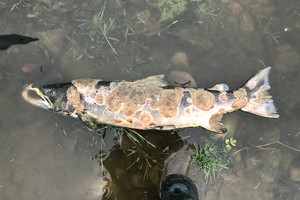Environment Agency allays dead fish fears in River Coquet
In the early winter months between November and January people are likely to see a large number of dead and dying salmon and sea trout in our region’s rivers.

Adult male salmon with an extreme occurrence of Saprolegnia
The Environment Agency would like to ease any public fears by confirming these are perfectly natural occurrences taking place at the end of the spawning season.
This comes after our emergency hotline recently received enquiries from worried members of the public and partner organisations in Northumberland about deceased fish being seen in the River Coquet.
Jon Shelley, Fisheries Technical Team Leader, Environment Agency in the North East, said:
Every year thousands of migrating salmon and sea trout complete their life-cycles by spawning in the gravel-rich upper reaches of our region’s rivers. Although a fantastic and natural occurrence, the spawning activity is also associated with many of those fish dying after they have successfully spawned, having completed their natural life cycle.
Many of the fish endure a long and arduous journey, and in the case of the salmon – they often go months without feeding and needing to rely on stored body fats to survive. They are likely to have successfully spawned before they die, giving life to future generations of salmon and sea trout.
There is no need to remove the dead fish from the water as they will continue to fertilise the river as they decay, and naturally boost its productivity.
Other reports may include the fish being described as lethargic, splashing around, and very commonly showing large white cotton wool shaped patches on their skin, which are signs of a common fungal infection.
This fungus is naturally present in cold freshwater and is usually associated with fish that have had experienced some physical damage during their long migration journey. Again this is a natural occurrence and although unsightly, these fish may also successfully spawn and should be left in the river.
Our fisheries team rely on the general public to report any fish deaths to the Environment Agency with the information helping officers gauge spawning activity and locations, as well as, giving a broad indication about the size of the returning run of adult fish. It is also important to rule out any other potential causes of death such as pollution events.
Any photographic evidence of the reported fish incidents that people are able to record is always greatly appreciated.
It is very important that any incidents of dead fish are reported to the Environment Agency by calling the emergency hotline number 0800 80 70 60, to enable any appropriate action to be taken by our officers.